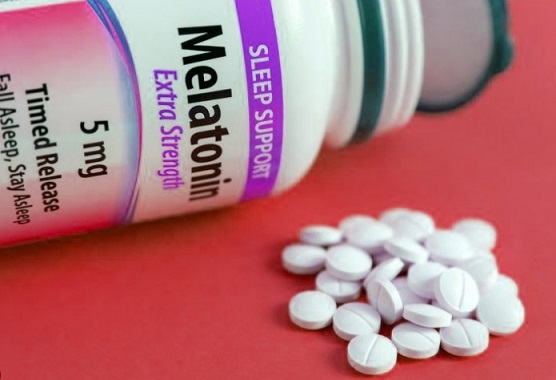Scientists from Slovakia Explore How Melatonin Helps Protect Red Blood Cells Against Oxidative Damage
Nikhil Prasad Fact checked by:Thailand Medical News Team Feb 03, 2025 2 months, 1 week, 3 days, 7 hours, 47 minutes ago
Medical News: Researchers from Comenius University in Bratislava, Slovakia, have made a significant discovery about the protective effects of melatonin on red blood cells. Their study, recently published in a peer-reviewed journal, reveals that melatonin can shield red blood cells from oxidative stress, a process that can lead to cellular damage and reduced oxygen transport in the body. The findings open new doors for understanding how this naturally occurring hormone might contribute to better blood health and overall well-being.
 Scientists from Slovakia Explore How Melatonin Helps Protect Red Blood Cells Against Oxidative Damage
Understanding Oxidative Damage in Red Blood Cells
Scientists from Slovakia Explore How Melatonin Helps Protect Red Blood Cells Against Oxidative Damage
Understanding Oxidative Damage in Red Blood Cells
Red blood cells (erythrocytes) play a crucial role in the human body by transporting oxygen from the lungs to tissues and organs. However, these cells are highly susceptible to oxidative stress due to their constant exposure to oxygen. Oxidative stress occurs when harmful molecules called free radicals accumulate, causing damage to cell membranes and proteins. This damage can lead to a decrease in red blood cell flexibility, making it harder for them to pass through tiny blood vessels and deliver oxygen efficiently.
This
Medical News report highlights how the research team investigated whether melatonin, known for its antioxidant properties, could prevent such damage. Melatonin is a hormone primarily produced by the pineal gland in the brain and is commonly associated with regulating sleep cycles. However, it also acts as a powerful antioxidant, neutralizing free radicals and protecting cells from oxidative damage.
The Study and Its Findings
The research team conducted laboratory experiments using human red blood cells exposed to oxidative stress. To simulate oxidative damage, the cells were treated with tert-butyl hydroperoxide (TBHP), a chemical known to induce oxidative stress in laboratory settings. The scientists then tested whether melatonin could counteract this damage by administering the hormone either before or after oxidative stress was introduced.
Their results were striking. The key findings of the study include:
-Preventive Effects of Melatonin: When red blood cells were pre-treated with melatonin before exposure to oxidative stress, they showed significantly better resilience. The cells maintained their ability to change shape and move through small blood vessels, a property known as deformability. This suggests that melatonin prepares red blood cells to withstand oxidative damage before it occurs.
-No Impact on Healthy Cells: Interestingly, melatonin did not affect red blood cells that were not exposed to oxidative stress. This indicates that the hormone does not alter the function of healthy cells, but rather serves as a protective agent when oxidative stress is present.
-Limited Benefits After Damage: When melatonin was added after the oxidative damage had already taken place, its benefits were
minimal. This suggests that melatonin is more effective as a preventive treatment rather than a remedy for already damaged cells.
Why This Research Matters
The findings from this study are important because oxidative stress is linked to various health conditions, including anemia, cardiovascular diseases, and inflammatory disorders. By showing that melatonin can protect red blood cells from oxidative damage, this research suggests potential applications in medical treatments and supplements aimed at improving blood health.
Moreover, these results may be particularly relevant for individuals who experience high levels of oxidative stress, such as those with chronic illnesses, aging populations, or people exposed to environmental toxins. The study also raises the possibility of using melatonin as a protective agent in blood storage and transfusion medicine, helping to maintain the quality of stored red blood cells.
Future Directions and Conclusions
While this study provides valuable insights, further research is needed to explore how melatonin’s protective effects can be applied in clinical settings. Scientists need to determine the optimal dosage and delivery methods for melatonin to be most effective in protecting red blood cells in real-world conditions.
The study underscores the importance of melatonin beyond its well-known role in sleep regulation. Its ability to shield red blood cells from oxidative damage highlights its potential in various health applications. However, individuals should consult with healthcare professionals before considering melatonin supplementation for this purpose, as more research is required to fully understand its long-term effects.
The study findings were published in the peer-reviewed journal: Molecules.
https://www.mdpi.com/1420-3049/30/3/658
For the latest on Oxidative Damage of Red Blood Cells, keep on logging to Thailand
Medical News.
Read Also:
https://www.thailandmedical.news/news/insights-into-red-blood-cell-abnormalities-in-covid-19-patients
https://www.thailandmedical.news/news/epicatechin-helps-protect-red-blood-cells-beneficial-for-those-exposed-to-covid-19
https://www.thailandmedical.news/news/coronaviruses-utilize-heme-and-red-blood-cells-to-spread-throughout-the-body-causing-multi-organ-damage
https://www.thailandmedical.news/news/long-covid-and-the-hidden-changes-in-red-blood-cells
https://www.thailandmedical.news/news/red-blood-cells-altered-by-changes-in-ph-levels
